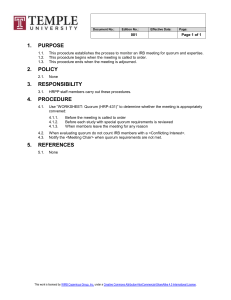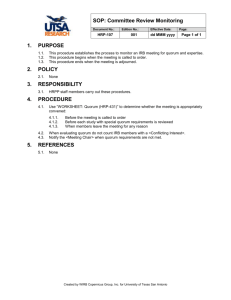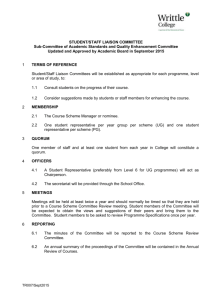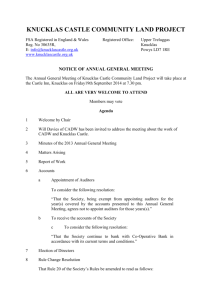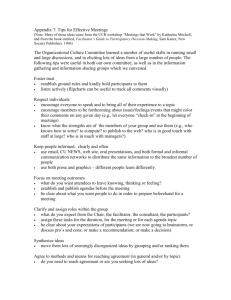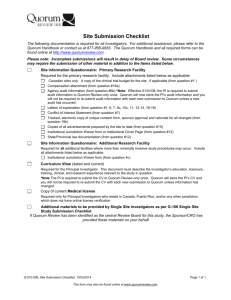Public Records Law
advertisement
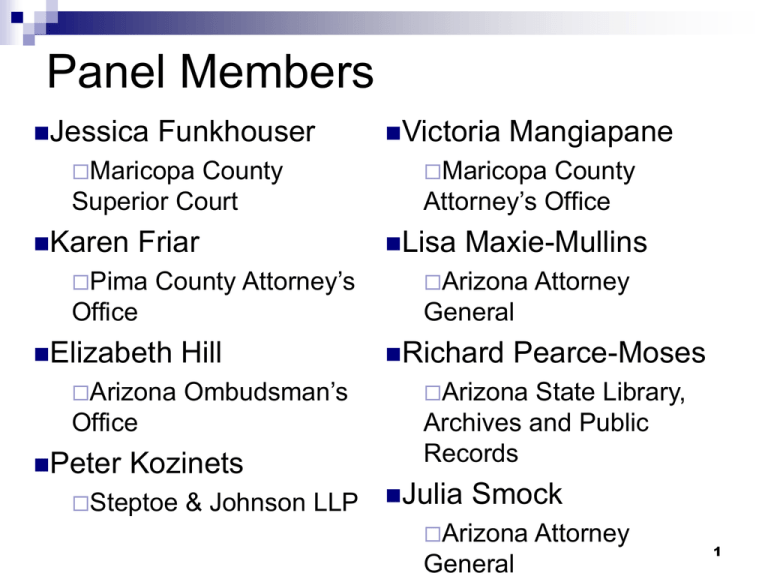
Panel Members Jessica Funkhouser Maricopa County Superior Court Karen Friar Pima County Attorney’s Office Elizabeth Arizona Hill Ombudsman’s Kozinets Steptoe Mangiapane Maricopa County Attorney’s Office Lisa Maxie-Mullins Arizona Attorney General Office Peter Victoria & Johnson LLP Richard Pearce-Moses Arizona State Library, Archives and Public Records Julia Smock Arizona Attorney General 1 Arizona’s Open Meeting Law State Bar of Arizona Phoenix, AZ February 2, 2010 Role of the State Ombudsman A.R.S. § 41-1376.01 Investigate complaints relating to public access law. Train public officials and educate the public on the rights of the public under the public access laws. 3 Ombudsman Citizens’ Aide Investigative Powers Receive testimony or evidence Inspect during normal office hours Examine confidential material Issue subpoenas Conduct hearings Make findings and recommendations 4 Role of the Attorney General’s Office Open Meeting Law Enforcement Team (OMLET) Investigate complaints Enforcement authority Education Arizona Agency Handbook, Chapter 7 Available online: www.azag.gov 5 Who Must comply? “Public Bodies” – A.R.S. § 38-431(6) Any multimember public body Includes Standing committee Special committee Advisory committee Subcommittee of or appointed by the public body 6 2007 Amendment! A.R.S. § 38-431 (went into effect 9/19/07) Defines advisory committee or subcommittee Any entity, however designated, officially established on motion or order of a public body or presiding officer of a public body Whose members are appointed for specific purpose of making a recommendation concerning a decision to be made or considered or a course of conduct to be taken or considered by the public body 7 What Must a Public Body Do? A.R.S. § 38-431.01 Meet and take legal action in properly noticed and agendized meetings. Exception: may meet in authorized executive sessions. 8 What is a Meeting? A.R.S. § 38-431(4) “Meeting” is a gathering, in person or through technological devices of a quorum of a public body Discuss Propose Deliberate Take legal action 9 Quorum? Majority of the public body – A.R.S. § 1-216(B) (unless specific statutory provision specifies a different number) 7 members quorum 5 persons quorum =4 =3 3 persons quorum =2 10 The “Initial” Notice A.R.S. § 38-431.02 Tells public where meeting notices will be posted. of state – public bodies of the State and charter schools Clerk of the board of supervisors – county, school districts and special districts Clerk of the city or town or mayor’s office – all public bodies of the city or town Secretary 11 “Initial” Notice Practicalities Did one get filed? Can you find it? Is it still current or out-of-date? Did you move your offices but not your notice location? Check them at least once a year. 12 Notice of Meetings A.R.S. § 38-431.02(C) 24 hours in advance of meeting Includes Saturdays IF the public has access to the physical posting location. To all members of the public body To the general public Exceptions: 1. Can recess and resume a properly noticed meeting to a later date by making an announcement at the meeting and describing what agenda items will be covered 2. Actual emergencies 13 Contents of Notice The name of the public body Date, Time, and Place Address and room number 14 Posting the Notice Designated posting location should be somewhere the has reasonable access. Clearly visible. Not behind locked doors. Make sure it can’t be borrowed. Make sure front and back can be read. 15 Proof of Posting Someone should document when the notice/agenda was posted Need a regular, routine business practice Clerk marks time of posting with initials Date / time stamp at exact time of posting 16 Additional Notice / Cities and Towns All public bodies shall give additional notice that is reasonable and practicable For cities and towns that have an internet site: Shall post public notices on website Technical problems with the internet will not preclude holding a meeting if other requirements are met 17 Social Events If more than a quorum may be present 1. Not required, but you can post a “courtesy agenda” announcing social event where a quorum may be present 2. Include statement that no business of the public body will be discussed & no action will be taken 3. Don’t discuss board business 18 The Agenda A.R.S. § 38-431.02(H) Must list the specific matters to be discussed, considered or decided at the meeting. Must contain information reasonably necessary to inform the public. Public body may discuss, consider or make decisions only on matters listed on the agenda and other matters related thereto 19 Common Agenda Problems Using language a regular person would not understand Legalese Acronyms Technicalese Using general categories without details “New Business” “Old Business” “Personnel” “Announcements” “Reports” “Open Discussion” 20 Current Events – A.R.S. § 38431.02(K) Chief administrator, presiding officer or a member of a public body may present a brief summary of current events without listing in the agenda the specific matters to be summarized provided that “Current Events” is an agenda item & public body does not propose, discuss, deliberate or take legal action 21 Meeting Location Pitfalls Inaccessible A board member’s house Country club Restaurants Inaudible Too small for a controversial meeting Recess and resume leave a staff person to give directions post a large notice start the meeting a little later 22 Virtual Board Meetings Ariz. Att’y Gen. Opinion I08-008 Open Meeting Law Allows a board to conduct deliberation and discussion in an online or “virtual” meeting through technological devices 23 Virtual Meetings Opinion specifically deals with board members contributing comments or editing a document on-line Public must be given notice of meeting – including beginning and end times 24 Virtual Meetings Public must have access to entire course of discussion or deliberations between board members Public must be able to identify which members contributed which comments and/or edits 25 Virtual Meetings Board must have a public records retention policy to cover maintenance and reservation of electronic documents Board must facilitate public access to the on-line meeting, including providing free internet access at or near board offices 26 Virtual Meetings Board must provide instruction for accessing and operating software to access on-line meeting This opinion does not permit an unending chat room for board members 27 Virtual Meetings Do not take this opinion lightly This type of meeting is fraught with possible Open Meeting Law violations 28 Public’s Rights Attend Listen Tape record Videotape Note: Public body cannot require attendees to identify themselves or sign in (unless they are making a presentation) 29 Public has NO Right to: Speak Disrupt 30 Dealing with Organized Protestors Warnings Removal Trespass 31 Warnings Provide ahead of time if possible – written rules of conduct/decorum – handouts at meeting Controlling Calls to the Public Clear instructions to security staff 32 Removal When warnings don’t work Video tape can be your friend Person removed not group Do they need to be allowed in again? Same meeting? = No Next one = Yes, but… 33 Removal case – Norse v. City of Santa Cruz Cite: 586 F. 3d 697 (9th Cir. 2009) Mayor ordered removal of Norse after he made a “Nazi salute” in protest of the Mayor’s ruling that the time for open comment had expired. City council had procedural rules in place that provided for the removal of any person who “uses language tending to bring the council or any council member into contempt, or any person who interrupts and refuses to keep quiet…or otherwise disrupts the proceedings of the council.” 34 Norse v. Santa Cruz (cont.) Norse sued city council for violation of his First Amendment rights. Holdings: Meetings of city councils and boards are not public forum – limited public forums only. Presiding officers may enforce reasonable and viewpoint neutral procedural rules to prevent disruption at their meetings. Focus on behavior not viewpoint. No violation of First Amendment to restrict speakers to subject at hand. No violation of First Amendment if stop speaker whose speech becomes irrelevant or repetitious. 35 Trespass When all reasonable requests have been ignored. Protect safety of Board members and members of the public. Barriers that allow normal ingress/egress = OK Provide notice of what conduct will result in trespass or other possible violations. May want to work with criminal attorney to advise your security staff. 36 Calls to the Public A.R.S. § 38-431.01(H) Optional Time, manner, place restrictions Can limit time (egg timer) Ban Repetition May require speakers on the same side with no new comments to select spokesperson prohibit disruptive behavior 37 Common Pitfall of Calls to the Public Discussing matters not listed on the agenda. Public body’s response is limited to: Direct staff to study the matter Ask that a matter be placed on a future agenda Respond to criticism Note: Responses must take place at the conclusion of the call to the public! 38 Meeting Etiquette Asking for trouble: Passing notes (even if it’s about when to order lunch) Whispering to fellow board members Privately using modern technology Quorum talking to individuals before the meeting officially starts or after the meeting officially ends. 39 Executive Sessions Only certain subject are allowed (A.R.S. § 38-431.03(A)) Personnel matters Confidential records Legal advice Litigation, contract negotiations, and settlement discussions Employee salary discussions International, Interstate, and Tribal Negotiations Purchase, Sale or Lease of Real Property 40 Executive Sessions Just because you CAN have one, should you? Public suspicion vs. actual need 41 Executive Session Agendas Only a general description is necessary Needs to be more than a statutory citation Should include the statutory section authorizing the executive session Need not contain information that would: Defeat the purpose of the executive session Compromise the legitimate privacy interests of a public officer, appointee, or employee Compromise the attorney-client privilege 42 Scheduling Executive Session It is permitted to vote to hold an executive session at an upcoming meeting - but it confuses the public Put it on the agenda for a vote at the meeting on the same day as the session Give direction or announce that there is no action to be taken until after returning to public session 43 Who may attend executive sessions - A.R.S. § 38-431(2) Members of public body Persons subject to a personnel discussion Auditor general Individuals whose presence is reasonably necessary in order for the public body to carry out its executive session responsibilities Clerk to take minutes/run tape Attorney to give legal advice Tip: Put on the record why certain staff are reasonably necessary. 44 Executive Session Pitfalls What happens in executive session stays in executive session! Failure to advise persons about the confidentiality requirement A.R.S. § 38-431.03(C) - mandatory Taking legal action. All votes must take place in public! 45 Personnel Matters Provide written notice to employee at least 24 hours before meeting. Employee may require meeting be held in public (does not include salary discussions). Employee does not have the right to attend executive session, but may. (Regardless, employee has access to portion of executive session meeting minutes.) 46 Common Questions Q: May you conduct personnel evaluations in executive session? A: Yes. See Ariz. Att’y Gen. Op. I96-012 Q: May a board interview applicants in executive session? A: Yes, if position is one appointed by the board. See Ariz. Att’y Gen. Op. I83-050. Note: Must vote for appointment in public session 47 Confidential Information Discussion or consideration of records exempt by law from public inspection Can receive and discuss information and testimony that state or federal law requires to be maintained as confidential Discussion may occur in open session when confidential information is adequately safeguarded (i.e. use initial for medical patients) 48 Legal Advice Discussion or consultation for legal advice with attorneys of the public body Lawyers for the PUBLIC BODY Not lawyers for someone else Not just because lawyer is present Avoid factual “updates” 49 What constitutes legal advice? “Legal advice" encompasses advice given to the public body regarding the legal ramifications of the facts and information given to him and the legality of the proposed action. City of Prescott v. Town of Chino Valley, 166 Ariz. 480, 485, 803 P.2d 891, 896 (1990) 50 NOT Allowed Discussion regarding the merits Once the members of the public body commence discussion regarding the merits or what action to take based upon the attorneys' advice, the discussion moves beyond the realm of legal advice and must be open to the public. 51 That includes… Debate over what action to take pros and cons policy implications of competing alternative courses of action *All of the above must take place in public* 52 Minutes A.R.S. § 38-431.01(B) Minutes or recording required Pursuant to A.R.S. § 39-101, permanent records must be on paper. Tape recordings – must be retained for at least 3 months! Caution: 53 Content of Public Meeting Minutes 1. Date, time and place of meeting 2. Members present & absent 3. General description of matters considered 4. Accurate description of legal action 5. Names of members who propose each motion 6. Names of persons, as given, making statements or presenting material to the public body; and 7. A reference to the legal action about which they made statements or presented material 54 Access to Public Meeting Minutes Minutes or a recording shall be open to public inspection 3 working days after the meeting NOT AFTER APPROVAL – no requirement in the OML to approve minutes 55 Meeting Minutes: cities and towns A.R.S. § 38-431.01(E) Cities and towns with a population of more than 2,500 shall: Post legal actions taken or any recording on its website within 3 working days Post approved meeting minutes of city or town council meetings on its website within two working days following approval Posting must remain on website for one year 56 Subcommittees and Advisory Committees A.R.S. §§ 38-431(6), 38-431.01(B) and (E)(3) Subcommittees and advisory committees of cities and towns with a population of more than 2,500 shall must: Take written minutes or record all meetings, including executive sessions Within 10 working days of the meeting, subcommittee or advisory committee of a city or town with a population of 2,500 or more must: Post a statement describing any legal action or Post any recording of a public meeting 57 Executive Session Meeting Minutes Shall have written minutes or a recording Burden of proof – Fisher case Shall include the following: Date, time and place of meeting Members present & absent General description of matters considered An accurate description of all instructions given Such other matters as deemed appropriate by the public body Shall be kept confidential (A.R.S. § 38-431.03(B)) 58 Access to Executive Session Meeting Minutes Meeting minutes of executive session shall only be released to: Members of the public body Officers, appointees, or employees who were the subject of discussion or consideration (only that portion) Auditor general in connection with an audit County attorney, attorney general or ombudsman when investigating alleged violations 59 Circumvention Cannot use any device to circumvent the law. “Splintering the quorum”: Serial communications (verbal, written, electronic, etc.) Polling “Hub and Spokes” of a wheel analogy “Daisy Chaining” 60 Prohibited 2-way communications Discussing Deliberating Taking Legal Action Back and forth among a quorum On a matter that could foreseeably come before the board (board business) 61 Serial Communications May Violate OML Verbal serial communications – going from one person to the next, sharing communications among a quorum would violate OML Arizona Agency Handbook § 7.5.2 62 Non-verbal Serial Communications Letters - series of letters from one member to the next would violate OML E-mail – occurring at different times will still constitute a “meeting” in violation of the OML Simultaneity is not required for there to be a “meeting” 63 Attorney General Opinion I05-004: E-mail Attorney General’s website www.azag.gov Board members cannot use e-mail to circumvent the OML Cannot use e-mail among a quorum to: Propose legal action Discuss legal action Deliberate on legal action Take legal action 64 E-mail Communications E-mail communications are treated the same as any other form of communication between board members. E-mails exchanged among a quorum of the Board that involve discussion, deliberations, or taking legal action on matters that may come before the Board constitute a meeting and thus violate the open meeting law. 65 For example: You have a 5 member board One member sends an e-mail to 2 members and there’s a response shared among all 3 You now have a discussion among three members = a quorum Violation 66 Facts vs. Opinion? There is no distinction between discussing facts vs. discussing opinions among a quorum Deliberation = “collective acquisition and exchange of facts preliminary to a final decision” Therefore, 2-way discussion of facts (among quorum) regarding potential board business = violation 67 Board might consider… a statement on e-mail that provides: “To ensure compliance with the Open Meeting Law, recipients of this message should not forward it to other members of the Board. Members of the Board may reply to this message, but they should not send a copy of their reply to other members.” 68 Staff E-mail Staff may send e-mail to board members. Passive receipt of information from staff, without more, does not violate the open meeting law. Example: board packets Staff may NOT send opinion or substantive communication about board business from a board member to enough other members to constitute a quorum. 69 Internet Social Networking Blogs, Twitter and Facebook can present same issues as e-mail among board members If a quorum of members is discussing board business using any technological means, a meeting may result 70 Internet Social Networking Like e-mail, this type of communication does not have to occur among a quorum of members simultaneously to be considered a meeting Like e-mail, this type of communication can occur on a personal computer, iPhone or BlackBerry and still be “board business” 71 Internet Social Networking This type of communication may be considered a virtual meeting requiring notice and access to technological equipment as it was discussed in the virtual meeting opinion This type of communication results in the creation of electronic public records which must be maintained, preserved and produced upon request 72 Communications with the Media The open meeting law does not prohibit a member of a public body from speaking to the media regarding matters that may come before the public body. § 38-431.09(B) added by 2008 Session Laws, Ch. 135, § 1 (effective 9/26/08) Attorney General Opinion I07-013 A.R.S. 73 Prohibited 1-Way Communication Proposing legal action “Propose” – means “to put forward for consideration, discussion, or adoption.” It only takes 1 person to propose legal action CANNOT propose legal actions outside of a noticed meeting 74 Proposing an Agenda Item? Proposing an item for the agenda does not propose legal action “without more” i.e. be cautious – communicate the TOPIC only NOT the legal action you want the board to take 75 “Propose” – EXAMPLES in the Opinion “Councilperson Smith was admitted to the hospital last night” Does NOT propose legal action “We should install a crosswalk at First and Main” Does propose legal action It’s more than a topic for the agenda because it urges or suggests an outcome 76 Now, you try these: Proposing Legal Action 101 “Here’s the recipe for the lemon bars I brought to the last meeting.” “I hope I can count on all of you to vote in favor of agenda item 5.” 77 More examples: Proposing Legal Action 301 Level Course “Here’s an article on a program the State of Oregon has put in place.” “We need to adopt a program like the one discussed in the attached article.” 78 Example: Master’s Program Level “We need to consider adopting a program like the one discussed in the attached article.” Does this propose legal action or only an agenda item? When in doubt. . . .? 79 More Examples: PhD Level “I think we should consider firing the City Manager at our next meeting.” “I would like to discuss the City Manager’s performance at our next meeting.” 80 Staff & Other Persons Cannot direct staff to communicate in violation of the open meeting law – A.R.S. § 38-431.01(I) Sanctions may be imposed upon any person who knowingly aids, agrees to aid or attempts to aid another person in violating this article – A.R.S. § 38431.07(A). 81 When in Doubt? RESOLVE ALL DOUBTS IN FAVOR OF OPENNESS. Remember: legal action taken during a meeting held in violation of any provision of the open meeting law is null and void unless ratified. 82 What to do when you learn that a potential OML violation has occurred. If in the thick of things = Recess/Access Can you resolve the issue and continue? Does the particular OML violation taint your whole meeting? Maybe not – AG Opinion I08-001 Should you relocate and resume? 83 After the meeting… Be Proactive Determine if you need to ratify any actions Meet with your media person Provide refresher training to staff involved If you receive a complaint: Be candid; respond promptly Provide materials that help you: minutes, ratification documents, videotapes, etc. 84 Ratification – A.R.S. § 38-431.05 Within 30 days after discovery of the violation or when should have been discovered with reasonable diligence Tanque Verde Unified School Dist. v. Bernini, 206 Ariz. 200, 76 P.3d 874 (App. 2003) (30 days after court ruling OK) 85 Ratification Continued… Notice 72 hours before the meeting Description of action to be ratified Clear statement that the body proposes to ratify a prior action Information on how to obtain detailed written description of the action Written description includes: Action to be ratified All of the preceding deliberations, consultations and decisions that preceded and related to the action Must be included in minutes 86 Attorney General Opinion I08-001 Re: Ratification If one agenda item is improper, the remainder of agenda is most likely valid. If improper item involves entire agenda/notice/meeting, all actions will be invalid. 87 Penalties - A.R.S. § 38-431.07(A) Members and any persons who aid, attempt, or agree to aid Civil penalty up to $500 for each violation Such equitable relief as the court deems appropriate Reasonable attorneys’ fees If intent to deprive the public of information – Court may remove public officer from office and Charge officer and any person that aided, agreed to aid, or attempted to aid, all the costs and attorney’s fees 88 Key Resources The Arizona Ombudsman – Citizens’ Aide handbook – The Arizona Open Meeting Law Ombudsman website www.azoca.gov Arizona Agency Handbook, Chapter 7, www.azag.gov – Quick Links Attorney General Opinions – www.azag.gov Quick Links or Publications Arizona Memory Project - http://azmemory.lib.az.us/ Case law 89
